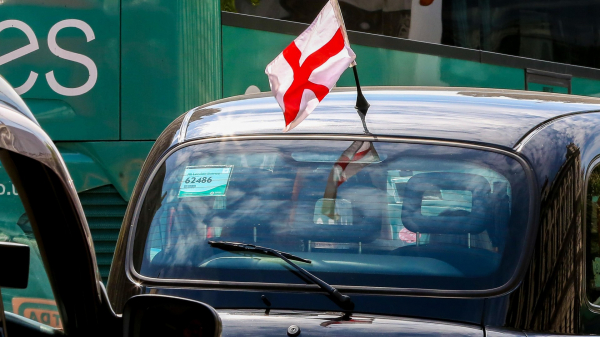Revoking the Ban: Cab Drivers Rally Against 'Bonkers' Restrictions on Flying English Flags for St. George's Day
In a fervent rebuttal against what they deem as 'political correctness gone too far,' cab drivers have vehemently opposed a ban imposed on the display of English flags during the celebration of St. George's Day. The National Private Hire Association (NPHTA), serving as the voice for London's cabbies, has demanded the temporary lifting of regulations governing flag adornments for a period of 24 hours. Transport for London (TfL) currently enforces stringent regulations prohibiting black cab drivers from exhibiting any patriotic emblems, threatening license revocation for non-compliance.
Under TfL's regulations governing signage and advertising in taxis, the St. George's Cross falls within the scope of prohibited material, a measure enacted since 2012 under the pretext of averting potential distractions to fellow drivers. In years prior, drivers enjoyed the freedom to embellish their vehicles in homage to St. George's Day and other national festivities. However, Dan Lawrie, director of NPHTA, contends that it's high time for a reevaluation of these guidelines.
Asserting the absurdity of the ban on displaying the English flag, Lawrie remarked, "We reside in England and should take pride in representing our nation. When does one draw the line on political correctness?" He further pointed to recent pro-Palestinian demonstrations in the capital, questioning the fairness of permitting protestors to proudly flaunt foreign flags while prohibiting the English flag on its national day.
This sentiment found resonance among some cab drivers, with Barry Gardin expressing, "We should have the liberty to display our flag. We are English, and it's our prerogative." Gardin highlighted the disparity in treatment, noting the allowance for Irish flags during St. Patrick's Day and the prevalent display of Palestinian flags in recent protests, deeming it hypocritical.
In response, a TfL spokesperson reiterated their commitment to passenger and driver safety, citing longstanding guidelines restricting the display of unofficial signage or flags in taxis and private hire vehicles. They emphasized the potential distraction such displays could pose to drivers and other road users, asserting the universality of these guidelines across all flags and signage.
This outcry follows a recent incident where benevolent bikers faced parking fines while delivering Easter eggs to ailing children, leaving a bitter aftertaste among the community.
In conclusion, the impassioned plea from cab drivers underscores a broader debate surrounding the balance between cultural expression and safety regulations in public spaces. As calls intensify for a review of the ban on flying English flags during St. George's Day, the discourse resonates beyond mere emblematic displays, touching upon themes of national identity, freedom of expression, and equitable treatment. While Transport for London maintains its stance on safety concerns, the controversy serves as a poignant reminder of the complexities inherent in navigating the intersections of tradition, policy, and public discourse in contemporary society. As the dialogue continues, it remains to be seen whether a compromise can be reached that satisfies both safety imperatives and the desire for cultural celebration among London's diverse communities.


